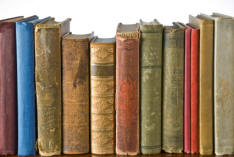Paper in itself is a rather difficult thing to handle and store. Add a couple of decades to it, raise the overall value and you get something doubly difficult. Antique books, maps, prints, and even personal letters and documents need proper handling and storage in order to minimize decay and make them last. The following are some basic techniques for handling antique papers and antique book collecting.

As much as possible minimize handling the papers with your bare hands. Never handle antique papers with your bare hands. The human skin secretes oils that can be damaging to sensitive antique items, especially paper. For one, the oil leaves marks on the surface and two, the chemical reaction of the oil with the paper might be unpredictable. When handling antique papers, its best that you use cotton gloves.
If you have seen an old newspaper, you know how brittle the pages are because of age. Real antique papers will be more brittle and thus more difficult to transport or move around. It's best to place something like a supporting cardboard or another tough paper underneath the antique to keep it properly supported.
Harsh light can cause damage to antiques including papers so make sure the antique won't be exposed to the sun or any harsh lights. Smoke and air pollutants can cause considerable damage as well.
Taking these things into consideration, the ideal place that we could store such antique papers and documents would be in a cool dry room. If you have the money, you can custom build a storage compartment for storing the papers.
Aside from harsh light and damaging smoke, humidity is another element that you need to be aware of. Having low humidity levels will keep the paper clean from the brown discolorations that we often call foxing. Another great benefit of keeping humidity low is the fact that it prevents mold growth on the paper.
Other things that you need to consider - avoid using metal clips as binding for the antique papers, eating in front of the paper, drinking is also a no-no. Just imagine spilling a can of soda over the antique paper, so avoiding these things is the best course of action.
Preservation of antique documents, pictures, etc., is a major aspect of archival science. It is also an important consideration for people who are creating family history, historical documents, scrapbooks and family trees. Common storage media are not permanent, and there are few reliable methods of preserving documents and pictures for the future.